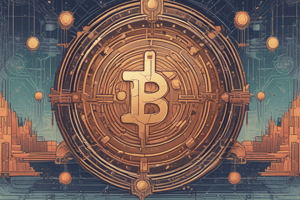Podcast
Questions and Answers
The speaker's first internet experience was with Internet Explorer in the 90s.
The speaker's first internet experience was with Internet Explorer in the 90s.
False (B)
The speaker holds a PhD in Computer Science.
The speaker holds a PhD in Computer Science.
True (A)
Incorrect security certificates issued by companies can lead users to access wrong websites without knowing.
Incorrect security certificates issued by companies can lead users to access wrong websites without knowing.
True (A)
Users have full ownership of their data on the internet according to the speaker.
Users have full ownership of their data on the internet according to the speaker.
Blockchain technology does not use any form of protection like private keys.
Blockchain technology does not use any form of protection like private keys.
Bitcoin aimed to enhance the role of banks and payment processors in transactions.
Bitcoin aimed to enhance the role of banks and payment processors in transactions.
Blockchain browsers create a less secure internet where big companies control user data and usernames.
Blockchain browsers create a less secure internet where big companies control user data and usernames.
The new internet introduced by the speaker eliminates the need for usernames, using only secure passwords.
The new internet introduced by the speaker eliminates the need for usernames, using only secure passwords.
Users have online property rights similar to those in the real world, according to the speaker.
Users have online property rights similar to those in the real world, according to the speaker.
The speaker grew up in India during the 90s before moving to Pakistan.
The speaker grew up in India during the 90s before moving to Pakistan.
Flashcards are hidden until you start studying
Study Notes
- Speaker grew up in Pakistan in the 90s and first experienced the internet with Netscape browser, becoming infatuated with it.
- Dedicated life to understanding how the internet functions, earning a PhD in Computer Science.
- Internet usage involves middlemen and companies, including browser software creators, internet service providers, and certificate issuers.
- These companies can issue incorrect security certificates, leading to users thinking they're accessing the correct websites when they aren't.
- Users don't own their data on the internet; it's controlled by big companies like Google and Facebook.
- Speaker proposes two requirements for a better internet: no middlemen and user ownership of data.
- Introduces blockchain technology as a solution, allowing users to own digital money and securely send transactions directly to others.
- Blockchain uses a private key, a highly secure password-like code, for protection.
- Bitcoin, the first application of blockchain technology, aimed to replace banks and payment processors with an open network secured by mathematics and cryptography.
- Blockchain browsers, such as Blockstack, create a parallel, more secure internet where users own and control their data and usernames.
- The new internet eliminates the need for passwords, replacing them with secure usernames.
- Concept of property rights exists in the real world but not online, with users renting from big companies.
- New internet introduces ownership, allowing users to own and control their usernames and data.
- Power dynamics shift from large companies to individuals with the new internet.
Studying That Suits You
Use AI to generate personalized quizzes and flashcards to suit your learning preferences.




